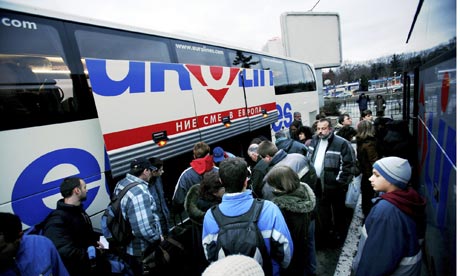Biden, López Obrador and the politics of migration: a return to the status quo?
Joe Biden’s presidential victory has brought temporary relief for many undocumented and mixed-status families in the US. Biden promised to reverse several of Trump’s executive orders on immigration and refugee policy within his first 100 days in office including reinstating the Deferred Action for Childhood Arrivals (DACA) program, ending the Migrant Protection Protocols (MPP) also known as “Remain in Mexico,” and creating a “road map” to citizenship for the approximate 10.5 million undocumented immigrants in the US. While Biden’s immigration agenda contains federal and local level priorities, little emphasis has yet been placed on the bilateral scale with the US’s southern neighbour, Mexico. Yet, bilateral immigration negotiations should be a priority for administrations on both sides of the border. In …

Brexit Buyers’ Remorse? Non, on ne bregrette rien
The vote to leave the EU was an outcome which surprised most commentators, bookies, and even those who voted for the winning side. In the aftermath of the result, John Gray, a popular political theorist, wrote that ‘voters inflicted the biggest shock on the establishment since Churchill was ousted in 1945’. It is hard to think that he is wrong. The only social classes which predominately voted Remain were ABs (affluent and middle-class voters), whereas C1 C2 DE (lower middle-class and working-class) voters all delivered majorities for Leave. As I predicted on this blog in January and contrary to many commentators’ expectations, the referendum engaged more voters than recent general elections. It generated the highest turnout in a UK election …

Post-Brexit wave of hate has laid bare the tensions and divisions in Britain
Following the vote to leave the European Union, there has been a sudden upsurge in racist incidents in Britain. The wave of hate has taken many people by surprise, and has laid bare some of the tensions and divisions eating away at the heart of the United Kingdom. It has also called into question Britain’s claim to be a liberal and inclusive multicultural society, leading to considerable soul searching. A state that has often spoken out against identity politics and prejudice abroad is now facing up to the reality that these issues need to be addressed back home. Predictably and understandably, much of the recent commentary as focussed on the divisive referendum campaign and the fact that the UK voted …

Brexit and the Anti-Elite Era
The result of the UK referendum on EU membership was an act of rejection of elite opinion. Almost the entirety of the country’s intellectual, economic and political establishment had explicitly opposed Brexit. There had been letters by Nobel laureates detailing the cost to UK research of a ‘Leave’ vote, a public statement by over 250 academics to the same affect, the official opposition of most British businesses as well as an avalanche of expert reports indicating the significant economic cost of leaving the world’s largest single market. In political terms, the ‘Remain’ campaign had the formal support of the country’s four largest political parties, the Tory-led national government and that of a plethora of international leaders, including the President of the …

Travelling to the UK? On the Pain, Separation and Dehumanisation of Student Families from ‘High-Risk’ Countries
The violence and despair of the militarised and exclusionary immigration policies of ‘Fortress Europe’ have been well documented. Institutionalised racism combines with an openly hostile bureaucracy of ‘paper walls’. In the UK Home Office, officials are encouraged through a perk system that awards shopping vouchers to officials who decline the highest number of asylum applicants per month. In Fortress Europe: Dispatches from a Gated Continent, Matthew Carr (2012: 120) describes the immigration-media nexus in the UK as a ‘mutually reinforcing consensus between governments, the media and the public that invariably depicts immigration as an endless crisis [and undocumented migrants as] dangerous and dehumanised invaders massing outside the nation’s borders’

How many Bulgarians and Romanians will come to the UK? Estimating migration is hard, but the lifting of restrictions on ‘A2’ nationals is unlikely to have the impact of the 2004 enlargement
On 1 January 2014 British labour markets will be open to Romanian and Bulgarian nationals (the “A2”) as they are to people from the rest of the EU. Many are wondering what the effects will be – although some impacts of Romanian and Bulgarian free movement have already happened, with an estimated 100,000 to 150,000 people born in the A2 currently living in Britain.
Still, the lifting of restrictions creates an expectation of increasing rates of immigration. Over the weekend Eric Pickles claimed to have seen estimates of how many Romanians and Bulgarians might arrive – though he would not reveal what the estimates were – and worried about pressure on the UK’s housing market. Other prominent politicians, including Theresa May and Ed Miliband, have raised concerns that increased migration may reduce wages, especially for the lowest earners.

Deepening Democracy, Deepening Divides: Can democracy and the international refugee regime coexist?
A report on deepening democracy released by the Global Commission on Elections, Democracy and Security recognised that the enfranchisement of displaced populations, including refugees, ‘is critical for ensuring the integrity of elections and the establishment of democracy’. But this statement belies a deeper interaction, and even conflict, between the international refugee regime and democracy.
What would ‘deepening democracy’ mean for the refugee regime? I suggest that strengthening democratic institutions could deepen divides between refugees and host communities. To ensure that the international refugee regime and democracy can successfully co-exist, we must think not just of deepening democracy, but of also balancing it with the rights of refugees.

Does Miliband say anything new about immigration?
Over a month ago, Labour leader Ed Miliband gave a much-trailed “major” public address on the topic of immigration. After Labour had largely remained quiet about the issue in the first two years of the Coalition government, Miliband touted his speech as the first step in a new conversation, and offered extensive apologies about Labour’s past policies on immigration in a bid to begin to rehabilitate Labour’s public image in this policy area. The apologies seemed to attract most of the headlines. Commentary from the political right welcomed this admission either wholeheartedly or with considerable scepticism (Daily Mail headline: “…What Sick Hypocrisy”). Commentators on the political left argued that Miliband should not have apologised for Labour’s record, disputed his claim …









